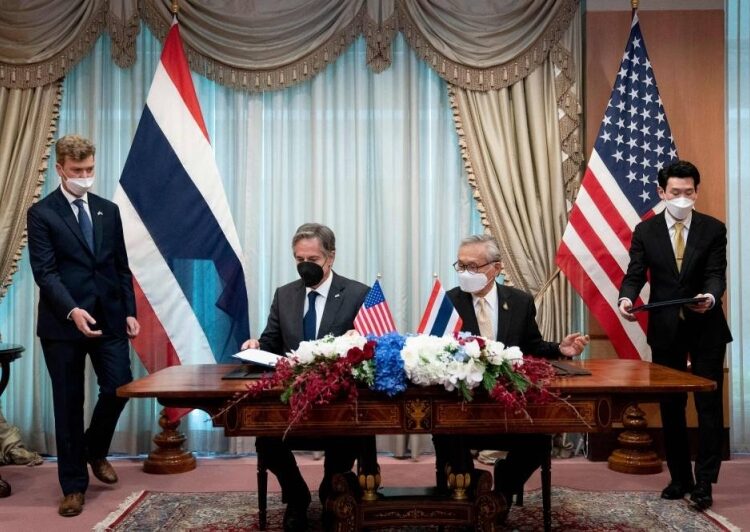BANGKOK -US Secretary of State Antony Blinken today hailed Thailand’s role in the renewed US push in Southeast Asia, a key area of competition with China, on a trip where he also sought new ideas on how to restore democracy in Myanmar.
Signing an agreement pledging to keep expanding ties, Blinken pointed to Thailand’s embrace of a new US-led economic plan for Asia as well as its efforts on climate change.
In Thailand, “we have an ally and partner in the Indo-Pacific of such importance to us in a region that is shaping the trajectory of the 21st century, and it is doing that every single day”, Blinken said after talks with Foreign Minister Don Pramudwinai.
Thailand is America’s oldest ally in Asia, famously offering elephants to Abraham Lincoln during the Civil War, but has also increasingly worked with a rising China.
The US secretary of state is visiting days after a stop by Chinese Foreign Minister Wang Yi, who has embarked on a more extensive tour of Southeast Asia in which he has highlighted Beijing’s lavish infrastructure spending.
The United States has identified China, with its authoritarian system and burgeoning technological and military resources, as its pre-eminent global rival but both nations have recently sought to lower the temperature, with Wang and Blinken meeting yesterday for an unusually long five hours in Bali.
Blinken, before flying to Bangkok late yesterday, said that his talks with Wang were “constructive” and added that the world’s two largest economies wanted to prevent their competition from getting out of hand.
President Joe Biden invited Southeast Asian leaders in May to Washington to demonstrate the US commitment to the region, even as the administration focuses on countering Russia’s invasion of Ukraine.
Critics have said the United States is bringing comparatively little to the table. Washington is pushing out US$40 billion, mostly in weapons, for Ukraine, and China last year promised US$1.5 billion for Southeast Asia.
The Biden administration counters that flashy announcements of state funds have never been the US forte and that it is prioritising cooperation in concrete areas such as public health, Covid-19 vaccination and education — areas that Blinken highlighted in Bangkok.
Logjam on Myanmar
Blinken also met with Thailand-based youth representatives from Myanmar, where the military in February 2021 ousted the elected government, slamming the door on a decade-long transition to democracy nurtured by the United States.
Biden, who has put a priority on championing democracy, responded by imposing a slew of sanctions on the junta but has had limited success in pressuring a powerful military that is historically suspicious of outside influence.
Asean, the Association of Southeast Asian Nations, more than a year ago put forward a plan in which the junta will engage the opposition but there has been no progress.
In an unusual common stance with the United States, Wang visited Myanmar last week and also encouraged the military to speak to opponents.
Blinken’s trip also marks a continued normalisation of the US relationship with Thailand, where then general Prayut Chan-O-Cha seized power in a 2014 coup, triggering US sanctions.
Blinken will later meet Prayut, who became prime minister in 2019 elections, which have ushered in a gradual return to open political discourse in Thailand.
In a joint statement signed by Blinken and Don, the United States and Thailand called democracy “essential” to the two countries’ idea of Asia.
“Strong democratic institutions, independent civil society, and free and fair elections are central to this vision, allowing our respective societies to reach their full potential,” it said.
Addressing one issue that is a high priority for the Biden administration, the statement said that Washington and Bangkok would promote “open and inclusive societies” for LGBTQ people.
Blinken also praised Thailand for signing up to a Biden plan to connect Southeast Asia with companies that are promoting green energy, saying that firms have already promised US$2.7 billion in the country.






Discussion about this post